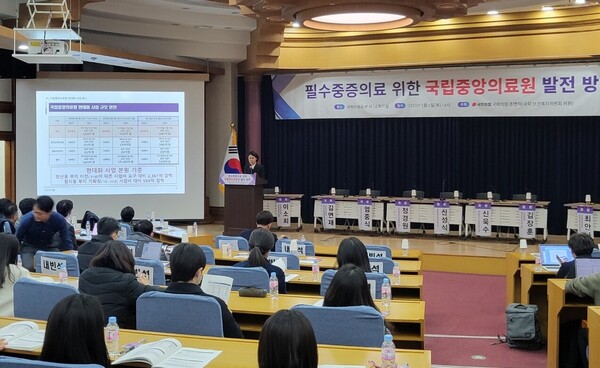Concerns are mounting that the finance ministry’s decision to downsize and relocate the National Medical Center (NMC) will make it difficult for the institution to play the role of the central hospital in dealing with infectious diseases.

At a public debate organized by Rep. Cho Myung-hee of the People Power Party on Thursday, participants criticized the Ministry of Economy and Finance’s decision to downscale NMC.
Lee So-hee, who heads NMC’s association of specialists, pointed out that the finance ministry has canceled a plan to expand NMC, which is why the an excessive number of hospital beds in Seoul. Still, the reality is quite different from it.
Lee noted that the transfer rate of severe trauma patients in Seoul stands at 10.2 percent, higher than the national average of 6.2 percent. In addition, the preventable trauma mortality rate also reaches as high as 20.4 percent. She added that in Seoul alone, 117 additional maternal fatal intensive care units (MFICUs) are needed.
Professor Lee emphasized that 1,000 beds are needed for the National Medical Center to function as a central medical facility for essential healthcare and infectious disease hospitals. She added that the optimal scale would make appropriate support possible in a pandemic situation and compensate for losses resulting from its role as a central infectious disease hospital.
“In the event of a pandemic, 390 skilled nurses should be deployed to the Central Infectious Disease Hospital. To accommodate the nursing staff, this hospital must secure at least 740 beds,” Lee said. “Medical benefits arising from the establishment of 1,000 beds in the main building cover the lost costs of operating a central infectious disease hospital.
‘NMC needs to expand beds to serve as a central infectious disease hospital’
Kim Yeon-jae, head of NMC’s infectious hospital operation center, pointed out that the reason the finance ministry decided to reduce the size of the NMC was wrong. A report commissioned by the ministry of the Korea Institute of Taxation and Finance pointed out that the low bed operation rate at the NMC was a problem.
"This data is a survey of the average hospital bed utilization rate from 2016 to 2019," he said. “It was not right for the report to say that the bed operation rate was low by producing the average number when the number of patients was barely recovering from the MERS outbreak in 2015 when patients dropped sharply due to the hospital's closure and concentration.”
Kim stressed that for NMC’s regional branches to play a central role as infectious disease centers, the headquarters hospital has at least 1,500 beds.
Professor Eom Joong-sik of the Infectious Disease Department at Gachon University Gil Medical Center emphasized that the government should invest intensively in the central infectious disease hospital to deal with future infectious diseases effectively.
Eom noted that MERS, prevalent for three months in 2015, caused a loss of 9 trillion won ($7.1 billion) in GDP. In addition, the loss compensation for beds paid until last year due to the Covid-19 response alone exceeded 7 trillion won.
“After the MERS outbreak, the government`s job was to build a control tower for the national quarantine system. But in the end, the private sector stepped up and did it,” he pointed out. “An infection control office was established, and a dedicated organization was established. Unfortunately, the system is holding up now. However, now is the time for the government to step up and change this system with bold investment."
Health-Welfare Ministry set about to persuade Economy-Finance Ministry
The Ministry of Health and Welfare said it would re-discuss the matter with the Ministry of Economy and Finance after completing the basic design.
"After the basic design is completed a year later, we are supposed to discuss the total project cost with the Ministry of Economy and Finance once again,” said Lee Seong-mi, director of the task force for relocating NMC at the Health-Welfare Ministry. “It is a negotiation on costs, such as raising the cost of construction, not expanding beds, but we will persuade the Economy-Finance Ministry based on plausible logic.”
“Since the finance ministry judges based on economic logic, negotiations are difficult,” Lee said. “We need to persuade them to understand why we need to expand the number of beds for NMC to serve as the central infectious disease hospital.”

